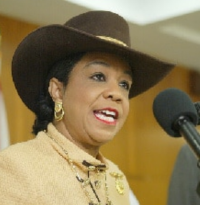Five Ways the Build Back Better Plan Could Advance Racial Equity

[WASHINGTON, DC] – Members of Congress are currently debating the fate of a social safety net package containing a number of historic investments with the potential to direct critical resources to address deep health and economic inequities faced by Black and brown communities.
Through transformational policies like the Child Tax Credit, universal pre-K, paid leave and significant expansion of health and social programs, the Build Back Better Act offers a concrete step toward building the “human infrastructure” needed to drive an equitable future and economy.
In this post, we highlight five ways the Build Back Better Act can promote racial equity. In addition to justice through generational investments in quality, affordable housing, health care, and child care. Plus, education and resources to tackle climate change.
By investing in these programs along with funding roads, railways, bridges and broadband internet, the two bills together could generate new jobs, help narrow the racial wealth gap and improve quality of life in local communities. While these bills alone won’t undue generations of systemic inequities, they offer an unprecedented opportunity to establish a firm foundation to meaningfully promote racial equity, build economic security among low-income workers and families, and ensure every community has the social and physical infrastructure needed to thrive.
WHERE THE BUILD BACK BETTER ACT STANDS NOW
House Democrats have advanced President Biden’s Build Back Better plan through a process called reconciliation that would pass the legislation through a simple majority in the Senate. House Democrats have also made a commitment to pass the plan together with a bipartisan infrastructure package that was passed in the Senate in August. The separate infrastructure package would cover funding to improve roads, bridges and public transportation.
The Build Back Better Act, however, has faced pushback by moderate Democrats Senator Joe Manchin (D-WV) and Senator Kyrsten Sinema (D-AZ), who oppose the total cost of the package and tax and climate change provisions included in the bill. The initial plan was estimated at $3.5 trillion and only represented 1.2% of GDP over ten years. Opposition by moderate Democrats has resulted in proposed cuts that will likely reduce the total package to between $1.5 – 2.3 trillion.
Progressive Democrats have advocated to keep funding at the levels proposed in the initial outline of the package but are negotiating with moderates in their caucus and with President Biden to ensure a bill is passed by the end of October when funding for many major transportation programs will expire.
Negotiations have centered around eliminating tuition-free community college, reducing the timeframe for when expansion of programs such as the Child Tax Credit and Affordable Care Act subsidies would expire, and lower funding amounts than originally proposed for housing and home-based care for seniors and people with disabilities.
With potentially more cuts on the table, the chance to make transformational investments to advance racial equity may be lost.
WHAT’S AT STAKE
-
Affordable Housing & Homeownersip
People of color disproportionately represent renters with lower incomes – 20% of Black households and 14% of Latinx households have incomes of 30 percent Area Median Income (AMI) or below, compared to 6% of white households. Although Black residents makeup 13% of the general population, they account for nearly 40% of people experiencing homelessness. Black renters also face higher rates of evictions. Nearly one in four Black renters live in a county where the eviction rate is more than double compared to white renters facing eviction. Evictions fall more heavily on women, with Black and Latinx women more likely to experience evictions than men.
These inequities are a product of racist housing policies that have crippling impacts on communities of color. The Build Back Better Act contains groundbreaking investments in housing including the creation of 750,000 housing vouchers to prevent evictions and homelessness and includes provisions to build and preserve rental housing by investing in new construction, rural housing, $80 billion to repair and preserve public housing and funding to assist with down payments to help aspiring homeowners.
-
Health
Black and brown people experience higher rates of chronic health conditions associated with a lack of access to quality, affordable health care and inequitable neighborhood conditions including fewer healthy food outlets, health care providers and green spaces for recreation. The pandemic only exacerbated these pre-existing racial injustices.
The plan contains various provisions that promote community development including funding for community land banks, increased investment in the Community Development Block Grant program and improvements to zoning and land use.
The plan will reduce the price of prescription drugs, extend recent enhancements to the Affordable Care Act such as increased tax credits and cost-sharing subsidies for families facing hardship, and close the Medicaid coverage gap in the 12 states that have not expanded the program. People of color account for sixty percent of the over 2 million adults with low incomes that lack access to quality, affordable health care because of the Medicaid coverage gap.
The Build Back Better Act also incorporates the Black Maternal Health Momnibus Act (Momnibus) designed to end the maternal mortality crisis that disproportionately affects Black and Indigenous people. The Momnibus includes an extension of postpartum Medicaid coverage for 12 months in every state. One-third of maternal deaths happen in the postpartum period. This expansion will provide the necessary community-based and social support families need after birth.
The original plan also included up to 12 weeks of paid family and medical leave to take time off for an illness or to care for a new baby or sick family member. The U.S. is the only high-income country to not offer paid leave. A universal and comprehensive paid leave program would advance gender and racial equity, however, with pressure to lower the cost of the bill, Democrats are considering reducing the paid leave provisions from 12 weeks to 4 weeks and imposing income limitations.
The COVID-19 pandemic highlighted the concentration of Black and Latinx workers in low-wage “essential” frontline jobs that do not include paid leave benefits. Women of color including Black women and Latinas are overrepresented in these jobs. Lack of paid family and medical leave combined with the gender pay gap and racial wealth gap means families of color are less able to withstand the financial hardships that occur when a loved one becomes ill.
Caregivers and progressive Democrats advocated for the Build Back Better bill to include a $400 billion investment in Medicaid home and community-based services that would create an estimated 777,000 well-paying jobs across the country to meet the care needs of people with disabilities and an aging population. Unfortunately, the House committees with oversight over these services only endorsed a $190 billion increase in funding.
Congress has a chance to change how the nation values care work. Black, brown and immigrant women comprise a significant portion of the personal care, nursing and home health aide workforce and are often underpaid and undervalued despite the critical services they provide to families and communities.
-
Child Care
The bill includes resources that expand child care resources and addresses child poverty. Children of color makeup over 70% of children in poverty, including 26.5% of Black children, 20.8% of Latinx children, 20.6% of Indigenous children and 7.7% of Asian, Native Hawaiian, and Pacific Islander children. Poverty restricts access to nutritious foods, stable homes, quality health care and much more.
Under the plan, families with low incomes would pay no more than 7% of their income on child care for kids younger than age 5, states will establish universal pre-k, individuals will have access to 12 week of paid family and medical leave, and recent improvements to the Child Tax Credit will be extended. According to the Children Defense Fund, the Child Tax Credit has the potential to cut poverty by 52% for Black children, 45% for Latinx children, 37% for Asian American and Pacific Islander (AAPI) children, and by 62% for Indigenous children.
-
Education
The racial wealth gap is widened by disportionate student loan debt carried by students of color. Nearly half of Black students, 67% of Latinx students, and 59% of Asian students have educational debt compared to 22% of white students. On average, Black students owe $25,000 more in student loan debt than white college graduates. The Build Back Better package proposes two years of free community college education, maximizing the Pell Grant to make college more affordable, major investments to HBCUs, Tribal Colleges and other minority-serving institutions, and job training.
-
Climate
Clean water accessibility, pollution, and proximity to dangerous raw materials are among some of the factors impacting the health and safety of Black and brown communities. Compared to the United States as a whole, Black residents are 75% and Latinx residents are 60% more likely to live near high-risk chemical facilities. Communities of color also breathe 66% more air pollution from vehicles than white residents. Black and brown residents are also more likely to be served by water systems detecting lead.
Hanging in the balance as policy makers decide on the final framework for the Build Back Better Act are several environmental justice initiatives including $30 billion to replace lead pipes and $10 billion to clean up toxic Superfund sites disproportionately located in Black and brown communities. The package will enact a nationwide energy efficiency and clean energy standard, create greener buildings and sustainable agriculture, invest in protecting natural resources and increase climate resilience through a Civilian Climate Corps that would create jobs and advance environmental justice.
WHAT YOU CAN DO
Use your voice now. It is critical that Members of Congress pass a package as close to the funding levels initially proposed and not forfeit an opportunity to make a serious investment in racial equity. Call the Capitol Hill Switchboard at (202) 224-3121 to reach your senator and representative or click here to use Community Catalyst’s form to send a message to your members of Congress to pass a Build Back Better Act that preserves the highest level of funding for these critical programs and to put health and racial justice first.






